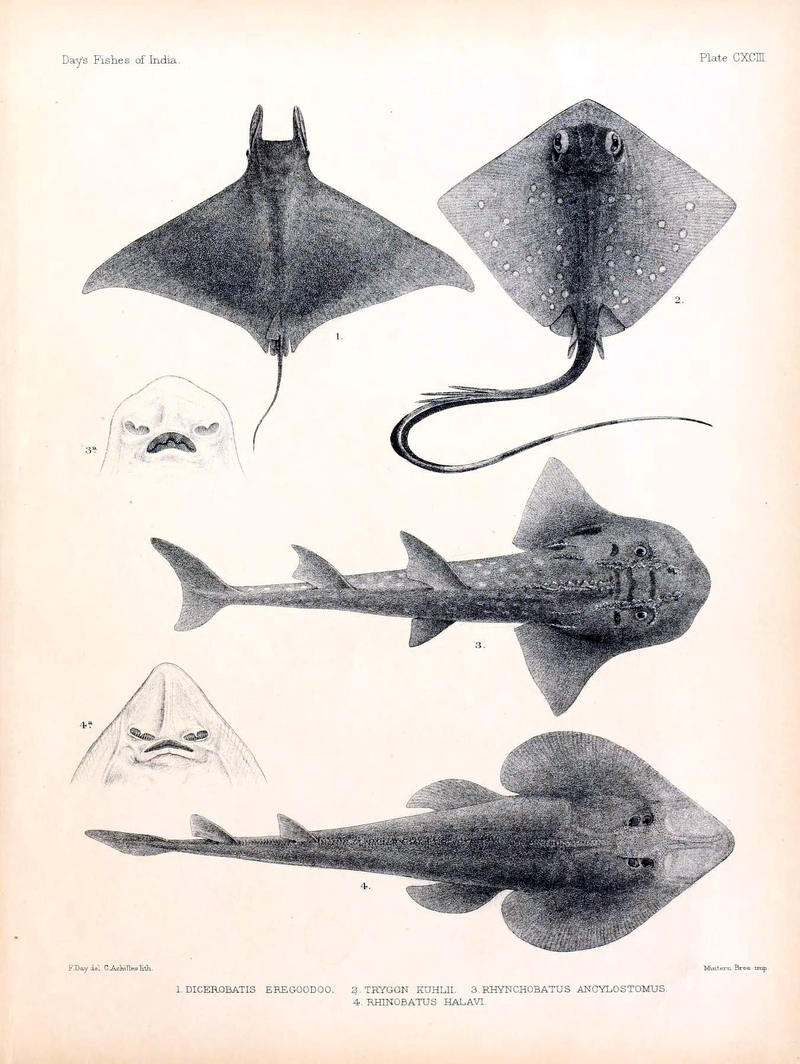|
| 질의: the snout | 결과: 220번째/527 | |
1. Dicerobatis eregoodoo = Mobula eregoodootenkee (pygmy devil ray); 2. Trygon kuhlii = Neotrygon kuhlii (Kuhl's maskray); 3. Rhynchobatus ancylostomus = Rhina ancylostoma (bowmouth guitarfish); 4. Rhinobatus halavi = Glaucostegus halavi (halavi guitarfish)
| 제목: | 1. Dicerobatis eregoodoo = Mobula eregoodootenkee (pygmy devil ray); 2. Trygon kuhlii = Neotrygon kuhlii (Kuhl's maskray); 3. Rhynchobatus ancylostomus = Rhina ancylostoma (bowmouth guitarfish); 4. Rhinobatus halavi = Glaucostegus halavi (halavi guitarfish)
| | 올린이: | Wiki Photos (---@---.---)
| |

| 해상도: 1352x1799
파일크기: 669533 Bytes
촬영일: 2020:01:24 09:54:35
등록시간: 2024:01:26 16:25:50
|
1. Mobula eregoodootenkee syn. Dicerobatis eregoodoo, 2. Neotrygon kuhlii syn. Trygon kuhlii, 3. Rhina ancylostoma syn. Rhynchobatus ancylostomus 4, Glaucostegus halavi syn. Rhinobatus halavi
1. DICEROBATIS EREGOODOO. 2.TKYGON KUHLII. 3. RHYNCHOBATUS ANCYLOSTOMUS. 4 RHINOBATUS HALAVl.
Date 1878
Author Francis Day
Full title The fishes of India : being a natural history of the fishes known to inhabit the seas and fresh waters of India, Burma and Ceylon / by Francis Day.
Page numbers Plate CXCIII
BHL Page URL https://www.biodiversitylibrary.org/page/5616228
Source: https://commons.wikimedia.org/wiki/File%3AThe_fishes_of_India_%28Plate_CXCIII%29_%287070556663%29.jpg
1. Dicerobatis eregoodoo = Mobula eregoodootenkee (Pygmy Devil Ray, Longhorned Mobula)
Pygmy Devil Ray or Longhorned Mobula (Mobula eregoodootenkee) is a species of eagle ray in the genus Mobula. It is endemic to the Indian Ocean and central-west Pacific Ocean, ranging from South Africa in the west to the Philippines in the east, north to Vietnam, and south to the northern coast of Australia. It is brownish-grey in color with a whitish underside and grows up to 100 cm wide. The species feeds on plankton and small fish. It is ovoviviparous, usually giving birth to a single pup in shallow waters, and the young stay in these waters until they mature.
Order: Myliobatiformes > Family: Mobulidae > Genus: Mobula > Species: Mobula eregoodootenkee
2. Trygon kuhlii = Neotrygon kuhlii (Kuhl's maskray, blue-spotted stingray)
Kuhl's maskray (Neotrygon kuhlii), is a species of stingray of the family Dasyatidae. The body is rhomboidal and colored green with blue spots. Maximum disk width is estimated 46.5 cm. It is popular in aquaria, but usually not distinguished from the blue-spotted ribbontail ray. The stingray’s lifespan is estimated at 13 years for females and 10 years for males. The blue-spotted stingray preys on many fish and small mollusks. It is also generally found from Indonesia to Japan, and most of Australia
Order: Myliobatiformes > Family: Dasyatidae > Genus: Neotrygon > Species: Neotrygon kuhlii
3. Rhynchobatus ancylostomus = Rhina ancylostoma (Bowmouth Guitarfish)
Bowmouth guitarfish (Rhina ancylostoma) is a species of ray and a member of the family Rhinidae. It is also known as the bowmouthed angel fish, shark ray, or mud skate. The species is widely distributed in the tropical coastal waters of the western Indo-Pacific, ranging from South Africa in the west to the Philippines in the east, north to Vietnam, and south to the northern coast of Australia. Rhina ancylostoma has a wide and thick body with a rounded snout and large shark-like dorsal and tail fins. It has a dorsal color pattern of many white spots over a bluish gray to brown background, with a pair of prominent black markings over the pectoral fins. The species can reach a length of 2.7 m and weight of 135 kg. Rhina ancylostoma is a strong-swimming predator of bony fishes, crustaceans, and mollusks. It is also highly distinctive in appearance, with multiple thorny ridges over its head and back.
Order: Rhinopristiformes > Family: Rhinidae > Genus: Rhina > Species: Rhina ancylostoma > Synonyms: Rhina cyclostomus
4. Rhinobatus halavi = Glaucostegus halavi (Halavi Guitarfish)
Halavi guitarfish (Glaucostegus halavi) is a species of ray found in the Indo-West Pacific (Red Sea to Gulf of Oman, with unconfirmed records in the area east of Oman). It feeds on small molluscs and bony fishes. The halavi guitarfish is viviparous and iteroparous, and individuals can grow up to 170 cm.
Order: Rhinopristiformes > Family: Glaucostegidae > Genus: Glaucostegus > Species: Glaucostegus halavi > Synonyms: Rhinobatus halavi, Raja halavi |
^o^
동물그림창고 똑똑전화 누리집
^o^
|
|